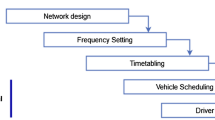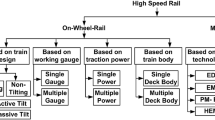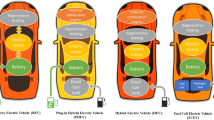Abstract
The train fueling cost minimization problem is to find a scheduling and fueling strategy such that the fueling cost is minimized and no train runs out of fuel. Since fuel prices vary by location and time from month to month, we estimate them by fuzzy variables in this paper. Furthermore, we propose a fuzzy fueling cost minimization model by minimizing the expected fueling cost under the traversing time constraint, maximal allowable speed constraint, tank capacity constraint, and so on. In order to solve the model, we decompose it into a nonlinear scheduling strategy model and a linear fueling strategy model. Based on the Karush–Kuhn–Tucker conditions, we design an iterative algorithm to solve the scheduling strategy model, and furthermore design a numerical algorithm to solve the fuzzy fueling cost minimization model. Finally, some numerical examples are presented for showing the efficiency of the proposed approach on saving fueling cost.


Similar content being viewed by others
References
Acuna-Agost R, Michelon P, Feillet D, Gueye S (2011) SAPI: statistical analysis of propagation of incidents. A new approach for rescheduling trains after disruptions. Eur J Oper Res 215:227–243
Bai Y, Mao B, Zhou F, Ding Y, Dong C (2009) Energy-efficient driving strategy for freight trains based on power consumption analysis. J Trans Syst Eng Info Tech 9(3):43–50
Chang CS, Sim S (1997) Optimising train movements through coast control using genetic algorithms. IEE P-Elect Pow Appl 144(1):65–73
Chien CF, Chen J, Wei C (2011) Constructing a comprehensive modular fuzzy ranking framework and illustrations. J Quality 18(4):333–350
Effati S, Roohparvar H (2006) The minimization of the fuel costs in the train transportation. Appl Math Comput 175:1415–1431
Ghoseiri K, Szidarovszky F, Asgharpour M (2004) A multi-objective train scheduling model and solution. Transp Res Part B 38:927–952
Higgins A, Kozan E, Ferreira L (1995) Optimal scheduling of trains on a single line track. Transp Res Part B 30:147–161
Howlett P (2000) The optimal control of a train. Ann Oper Res 98:65–87
Howlett P, Pudney P, Vu X (2009) Local energy minimization in optimal train control. Automatica 45(11):2692–2698
Khmelnitsky E (2000) On an optimal control problem of train operation. IEEE T Automat Contr 45(7):1257–1266
Kraay DR, Harker PT, Chen B (1991) Optimal pacing of trains in freight railroads: model formulation and solution. Oper Res 39:82–99
Li X, Liu B (2006) A sufficient and necessary condition for credibility measures. Int J Uncertainty Fuzziness Knowl-Based Syst 14(5): 527-535
Li X, Zhang Y, Wong HS, Qin Z (2009) A hybrid intelligent algorithm for portfolio selection problem with fuzzy returns. J Comput Appl Math 233(2):264–278
Li X, Ralescu D, Tang T (2011) Fuzzy train energy consumption minimization model and algorithm. Iran J Fuzzy Syst 8(4):77–91
Liu B, Liu Y (2002) Expected value of fuzzy variable and fuzzy expected value models. IEEE Trans Fuzzy Syst 10(4):445–450
Liu B (2007) Uncertainty Theory, 2nd edn. Springer, Berlin
Liu R, Golovitcher IM (2003) Energy-efficient operation of rail vehicles. Transp Res Part A 37:917–932
Miyatake M, Ko H (2010) Optimization of train speed profile for minimum energy consumption. IEEJ T Electr Electr 5:263–269
Nourbakhsh SM, Ouyang YF (2010) Optimal fueling strategies for locomotive fleets in railroad networks. Transp Res Part B 44:1104–1114
Tonquist J, Persson A (2007) N-tracked railway traffic re-scheduling during disturbances. Transp Res Part B 41(3):342–362
Yang L, Li K, Gao Z (2009) Train timetable problem on a single-line railway with fuzzy passenger demand. IEEE Trans Fuzzy Syst 17(3):617–629
Acknowledgments
This work was supported by the National Natural Science Foundation, China (No. 71101007), the National Science Council, Taiwan (No. NSC100-2628-E-007-017-MY3), the National High Technology Research and Development Program, China (No. 2011AA110502), the Specialized Research Fund for the Doctoral Program of Higher Education, China (No. 20110009120036), the Fundamental Research Funds for the Central Universities (No. 2011JBZ014), and the Toward World-Class University Project (No. 101N2074E1). The authors also gratefully acknowledge the helpful comments and suggestions of the reviewers, which have inspired us to improve the presentation of this work.
Author information
Authors and Affiliations
Corresponding author
Rights and permissions
About this article
Cite this article
Li, X., Chien, CF., Yang, L. et al. The train fueling cost minimization problem with fuzzy fuel prices. Flex Serv Manuf J 26, 249–267 (2014). https://doi.org/10.1007/s10696-012-9159-y
Published:
Issue Date:
DOI: https://doi.org/10.1007/s10696-012-9159-y




